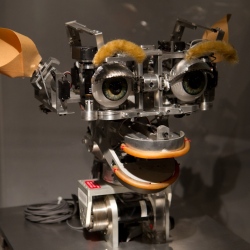
Masters students from the EPFL Automatic Control Laboratory (LA) are developing a robot that can play foosball (table football) for their semester project.
One of the levers has a mechanical arm capable of propelling the ball into the opposing goal at a speed of 6 meters per second.
“This is already enough to beat the average player,” said researcher Christophe Salzmann, who heads the project. And this is only the beginning. The robot should eventually prove to be more accurate, faster, and more strategic than any player.
The robotic arm depends on two computers: one to control the mechanical movement of the arm and the other to provide information about the position of the ball. A high-speed camera below the table films the game board. “Through image processing algorithms, we can analyze the movement of the ball in real time. This information is transmitted to the computer that controls the movement and positioning of the arm,” says Martin Savary, who participated in the project.
“Potentially, the computer can simultaneously analyze many more parameters than a human and process information faster. It could simultaneously analyze the location of all players and the exact trajectory of the ball after it ricocheted off the edges. All that remains is to develop a strategy,” explains Christophe Salzmann.
“Ultimately, we could imagine organizing games between opposing robots.”
